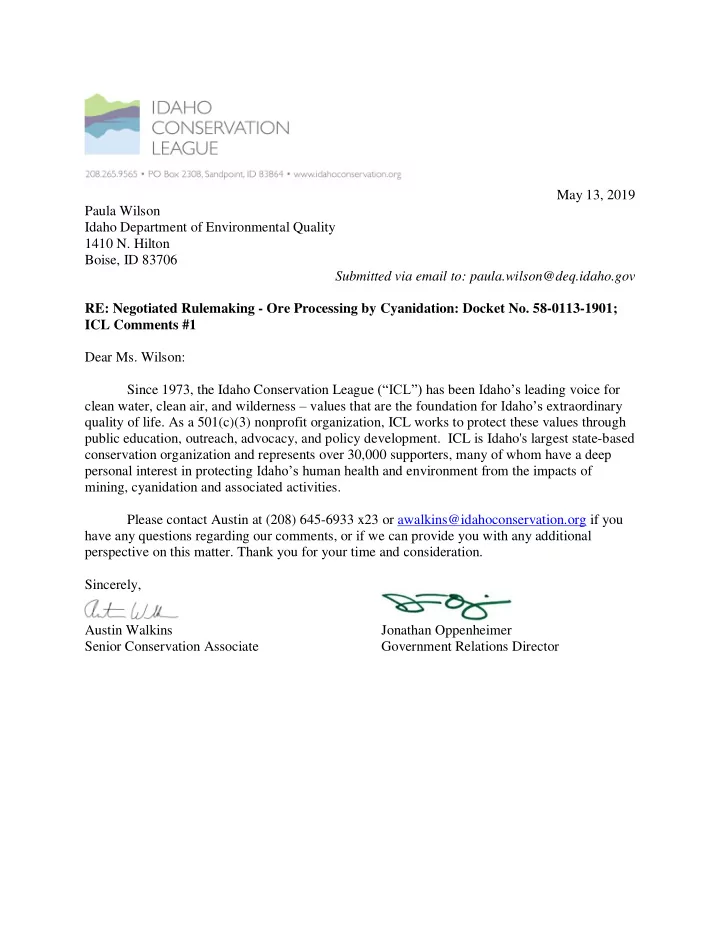

May 13, 2019 Paula Wilson Idaho Department of Environmental Quality 1410 N. Hilton Boise, ID 83706 Submitted via email to: paula.wilson@deq.idaho.gov RE: Negotiated Rulemaking - Ore Processing by Cyanidation: Docket No. 58-0113-1901; ICL Comments #1 Dear Ms. Wilson: Since 1973, the Idaho Conservation League (“ICL”) has been Idaho’s leading voice for clean water, clean air, and wilderness – values that are the foundation for Idaho’s extraordinary quality of life. As a 501(c)(3) nonprofit organization, ICL works to protect these values through public education, outreach, advocacy, and policy development. ICL is Idaho's largest state-based conservation organization and represents over 30,000 supporters, many of whom have a deep personal interest in protecting Idaho’s human health and environment from the impacts of mining, cyanidation and associated activities. Please contact Austin at (208) 645-6933 x23 or awalkins@idahoconservation.org if you have any questions regarding our comments, or if we can provide you with any additional perspective on this matter. Thank you for your time and consideration. Sincerely, Austin Walkins Jonathan Oppenheimer Senior Conservation Associate Government Relations Director
Performance Based Measures The stated intent of this rulemaking is, in part, to allow more flexibility in the form of performance-based compliance measures rather than strict design standards. While we can support this approach in principle, particularly when new technology may better protect the environment and human health, it is critical that the environmental benefits outweigh the potential risks. Performance-based regulations must be paired with appropriate assurances, clear guidance and must be backed by quantitative data. We wish to stress that it is never appropriate to implement performance-based measures that are not as protective as the existing rules, regulation or guidance. While we recognize the desire by some mining advocates to avoid, what may be perceived as, unnecessarily protective measures, we are curious how DEQ will demonstrate that a single-layer liner is as protective as the double-layer liner currently required by rule. During rulemaking discussions, it was stated that double-layer liners are more prone to abrasion, rupture or tears. We question why this would this not also be the case for single-layer liners? In what scenario is an extra layer of protection, in fact, less protective? As with other elements of this rulemaking, DEQ must demonstrate that the rule is consistent with Idaho Code 39-107(D)(2), which requires the decision to be based upon: (a) The best available peer reviewed science and supporting studies conducted in accordance with sound and objective scientific practices; and (b) Data collected by accepted methods or best available methods if the reliability of the method and the nature of the decision justify use of the data. Furthermore, reliance upon performance-based approaches is only appropriate when the system is performing as expected. To that end, monitoring of a system, and the effected environment, are fundamental components of a performance-based approach. DEQ and/or the permittee must be able to defensibly and quantifiably demonstrate that they are operating at the required performance level. This must include monitoring of the affected environment, including indicators associated with, but not limited to, groundwater, soil, and surface water resources, as well as impacts to any affected fish or wildlife species. Timeline We strongly caution against rushing such an important rulemaking simply to get this proposed rule administratively finalized prior to the 2020 Idaho Legislature. While we recognize the desire on the part of some mining interests to expedite consideration of their proposal, we are concerned that if done inappropriately, these rules could threaten Idaho’s water quality and aquatic species. Ensuring that all changes are supported by sound science and reasoning may exceed the proposed timeline. After all, it is more important to ensure that the rule is adequately protective, because an inadequate rule could result in future delays at the rulemaking or project- level stages that could result in even longer delays. In the end, we are concerned that an Idaho Conservation League Comments #1 Negotiated Rulemaking - Ore Processing by Cyanidation: Docket No. 58-0113-1901; ICL Comments #1 2
expedited timeline may result in inadequate rules and longer delays which would neither protect the environment, nor meet the needs of Idaho’s regulated community. Idaho Conservation League Comments #1 Negotiated Rulemaking - Ore Processing by Cyanidation: Docket No. 58-0113-1901; ICL Comments #1 3
Recommend
More recommend